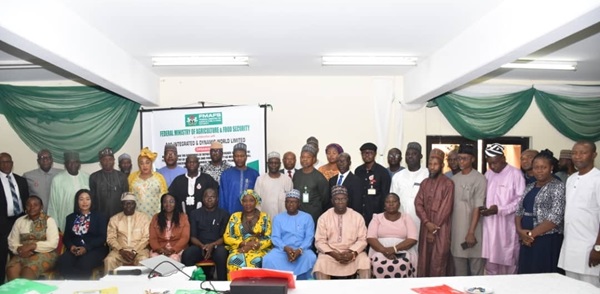
The Federal Ministry of Agriculture and Food Security has called on stakeholders in the nation’s food production and security chain to elevate procurement practices, to ensure economic development.
The call was made at a one-day workshop on public procurement, a collaborative effort between the ministry and Messrs. AAA Integrated and Dynamic Works Ltd., held recently in Abuja. The aim of the forum was to foster good procurement practices to catalyse economic development and sustainability.
Speaking at the event, the permanent secretary of the ministry, Dr. Ernest Umakhihe emphasised the significance of the workshop under the theme, “Enhancing the Values of Public Procurement in the Agricultural Sector”.
Represented by the director of human resources management, Mrs. Oluwatoyin Alade, Umakhihe underscored the role of sound procurement practices in realising value for money, ultimately translating into improved human welfare and heightened economic growth.
Umakhihe referred to President Tinubu’s delineation of top priorities in the 2024 budget, aptly named the “Budget of Renewed Hope”. These priorities included national defense and internal security, local job creation, macro-economic stability, investment, environmental optimisation, human capital development, poverty reduction and social security. He astutely connected these priorities directly to the agricultural sector, elucidating that the ministry’s activities predominantly involve goods, works, and services—procurement endeavours.
Expressing the imperative nature of staying updated on the latest developments in the procurement process, Umakhihe stressed the need for seamless and efficient delivery of the agriculture sector’s goals and objectives.
Preceding the permanent secretary, the director of the procurement department, Mr. Sunday Adebomi provided a succinct background of the Bureau of Public Procurement (BPP).
He shed light on the genesis of the Budget Monitoring and Price Intelligent Unit (BMPIU), also known as ‘Due Process’, established in 2001 to enforce the Federal Government’s Public Procurement Reform Policy, to minimise abuses in the award and execution of public sector contracts in Nigeria.
Adebomi outlined the objectives of establishing the BPP, including the harmonisation of existing government policies and practices, ensuring probity, accountability and transparency in the procurement process, and establishing pricing standards and benchmarks.
The workshop featured informative presentations by officials from the BPP, followed by interactive sessions where participants, including directors of departments, heads of units, chief executive officers/director-generals of agencies and institutes under the Federal Ministry of Agriculture and Food Security, engaged in questions and answers.
The event served as a crucial platform to not only advocate for improved procurement practices but also to enhance knowledge and collaboration among key stakeholders in the agricultural sector, aligning with broader national development goals.


